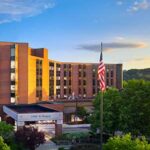Latinos make up less than 2 percent of Allegheny County’s population, yet their numbers have increased 71 percent in the past decade. The results of a new effort to learn from this growing population will be shared today at the American Public Health Association 2016 Annual Meeting & Exposition in Denver.
The University of Pittsburgh Graduate School of Public Health’s Center for Health Equity partnered with The Latino Family Center and Casa San Jose, the region’s two main service organizations that target Latinos, to seek a better understanding of the strengths and needs of this growing community. Such an assessment is necessary to identify the strategies and programs to best serve and learn from this diverse population.
In the past year, a team of trained facilitators engaged 66 Latinos living in the Pittsburgh region in discussions covering their routines, concerns, successes, community support and dreams. The findings were transformed into detailed infographics, available in English and Spanish, to easily guide organizations and people who interact with Pittsburgh’s Latinos.
While there were many findings, the main conclusion was that service agencies need to do active outreach to share programs that support strengthening families and helping them cope with unexpected adversity.












